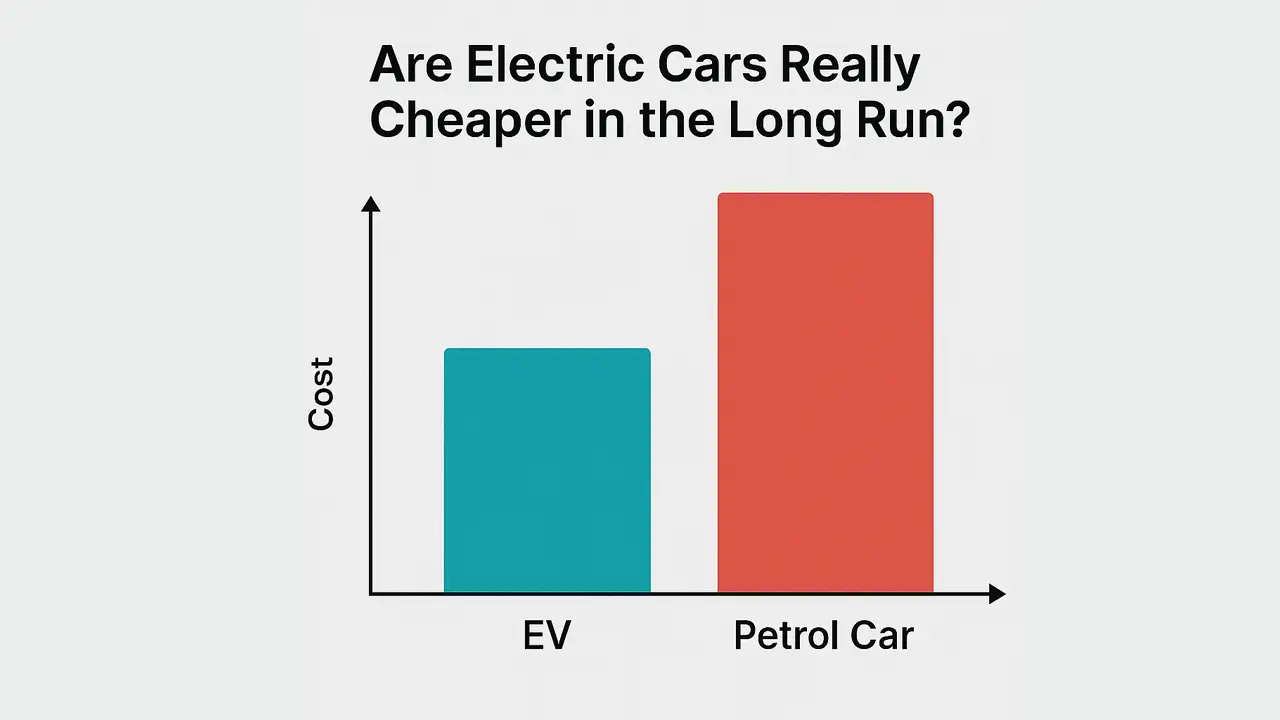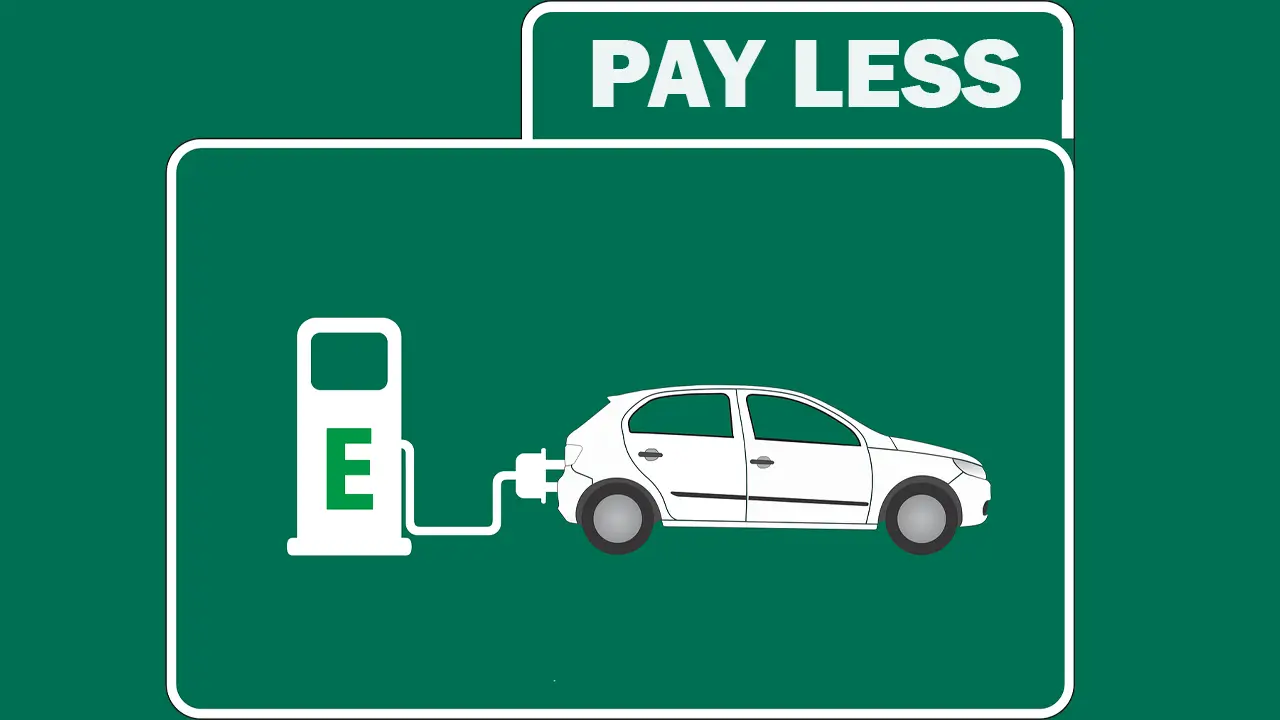Electric cars are no longer a futuristic fantasy. They’re on the roads, in your neighbor’s driveway, and maybe even on your wish list. But let’s be honest every time someone mentions buying an EV (electric vehicle), the same question always pops up:
“Are they really cheaper in the long run?”
It’s a fair question, especially when the price tag on some electric cars still feels higher than a comparable gas-powered model. So today, I want to walk you through the real costs without the hype, without jargon, and without confusing spreadsheets. Just straight-up facts, some honest perspective, and a little friendly advice from someone who’s been digging deep into this topic. Let’s get into it.
The Upfront Cost: Yes, EVs Still Cost More (For Now)
Let’s start with the part where everyone sees first the price. In general, electric cars do cost more upfront than their gasoline counterparts. Take something like a Tesla Model 3 versus a Toyota Camry. One’s electric, the other runs on gas. Even with incentives, that initial price difference is real. However, that’s not the whole story.
Governments, especially in the U.S., offer tax credits and incentives that can shave off up to $7,500 or more from the purchase price. Some states add even more rebates. Still, even after incentives, some EVs are priced higher than traditional cars. But remember the sticker price is just the beginning.
Fuel Costs
Think about your monthly gas expenses. If you’re driving a lot commuting, road-tripping, or doing gig work you already know how fuel costs can add up.
Now compare that with charging an electric car. On average, charging at home costs about 3 to 4 times less than filling up at the gas station. If you’re lucky enough to have access to free public charging stations, that’s even better.
To keep it simple:
- Filling up a gas car: $50–$100 a week (depending on driving habits and fuel prices)
- Charging an EV at home: around $10–$15 a week
That adds up fast. Over the course of a year, that’s thousands of dollars saved. And if gas prices spike, which they often do? Those savings get even bigger.
EVs Are Simpler. That Means Fewer Repairs.
Here’s something a lot of people don’t think about until later electric vehicles have fewer moving parts.
There’s no oil to change. No spark plugs. No exhaust system. No timing belt. No fuel injectors. Basically, a lot of the stuff that breaks on gas cars… doesn’t exist in an EV.
That’s not to say EVs never need repairs. Tires, brakes, and windshield wipers still wear out. But compared to internal combustion engine vehicles, the maintenance costs are significantly lower.
In fact, some studies show that EVs cost about 40% less to maintain over their lifetime. That’s a pretty big deal especially if you plan to keep your car for a long time.
Battery Replacement
One thing that makes a lot of potential EV buyers nervous is battery replacement cost. And I get it. Batteries aren’t cheap. If you need a new one, the cost could be $5,000 to $15,000 depending on the car.
But here’s what most people don’t realize: batteries are lasting a lot longer than expected. Many electric cars are hitting 200,000 miles or more without major battery issues. Plus, most manufacturers offer 8- to 10-year warranties on their batteries.
Unless you’re keeping the car for 15–20 years, it’s unlikely you’ll need to replace the battery. And by then, battery prices will probably be much lower than they are today.
Also Read: What Ford vehicles are made in Mexico?
Insurance
Another cost to consider is insurance. Depending on the make and model, EVs can be more expensive to insure. The reason? Some parts (like battery packs or sensors) can be pricey to replace if damaged, and not all repair shops are EV-certified.
However, some insurers are catching up and offering discounts for EV drivers, especially if you have a strong safety record or your car comes loaded with driver-assist features. The best advice here? Shop around. Get quotes from a few providers before jumping to conclusions.
Resale Value
The resale value used to be a weak spot for EVs. Early electric models dropped in value quickly, mostly because the technology was changing so fast. But now? It’s a different story.
Brands like Tesla, Rivian, Hyundai, and even Ford are holding their value much better than before. As more people shift to electric, demand for used EVs is rising which means your future trade-in or resale could be stronger than you think.
That said, the market can be unpredictable. If you’re buying an EV purely for resale value, choose a well-known brand with solid battery life and over-the-air update support.

Charging Infrastructure
One of the most common concerns I hear is: “What if I run out of charge?” Fair concern. But the reality is, that charging stations are popping up everywhere, especially in the U.S. thanks to federal funding. Tesla’s Supercharger network is already widespread, and new universal chargers are being built that support all EV brands.
If you install a charger at home, the experience becomes seamless just plug in overnight and wake up to a full “tank.”
Of course, if you live in an apartment or don’t have access to home charging, it’s worth checking how easy public charging is in your area. It’s improving fast, but it’s still a consideration depending on your location.
Recent Stories
- Audi GT50 Concept: A Loud Reminder of Why Car Enthusiasts Fell in Love With Audi
- Nearly 30% of UK Drivers Believe Car Tax Should Be Based on Mileage — Survey
- Why Planes and Boats Escaped the Luxury Tax But Cars Didn’t
- Australia’s Headlight Confusion: Authorities Warn Drivers After Viral $250 Headlight Rule Goes Wild Online
- 2025 Hyundai Venue Facelift Launched in India – Full Details, Variants, and Price
The Environmental Bonus
While this article is focused on costs, it’s hard to ignore the environmental side of EVs. Fewer emissions mean less wear on our cities, cleaner air, and potentially fewer healthcare costs over time. And in many cities, driving an EV gives you perks like access to carpool lanes, reduced toll fees, and preferred parking spots—little things that save you time and money over the long haul.
Author’s Take
If you’re the kind of person who keeps a car for 8–10 years, drives regularly, and doesn’t mind adapting to something new, yes electric cars are genuinely cheaper in the long run.
It’s not just about saving on gas or avoiding oil changes. It’s the entire package lower fuel costs, fewer repairs, less maintenance hassle, and growing resale value that makes electric cars a smart financial choice for many people.
That said, EVs aren’t for everyone yet. If you live in a rural area with limited charging options or drive long distances through remote places, a gas car might still be more convenient for now.
But things are changing quickly. And from what I see? EVs are only getting better, more affordable, and easier to live with every year. So next time someone says, “Electric cars are too expensive,” just smile. Because you know the bigger picture and the long game speaks for itself.
